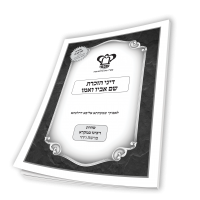Many Dinim in the Torah are dependent on speech, such as Nedarim, Limud HaTorah, saying testimony (Eidus), uttering Hashem’s name, Sefiras Haomer, etc. The question is - how is the written word recognized? For example, if one is writing Torah thoughts, does he have to say Birkas Hatorah first? Is a written statement considered an actual neder/testimony? Is a written falsehood considered a lie? This sugya discusses all these scenarios and others.This concept is relevant to Parshas Yisro, as the Mechilta discusses the communication between Yisro and Moshe. The poskim use this Mechilta as a basis for this very subject.
| Booklet Details | |
| Pages | 83 |
| Published | 5783 |
| Series | V'yavinu B'Mikrah |
Related Products
סוגיות במצות ספירת העומר
New and enhanced version of three Sefiras Haomer sugyos - bound together in one deluxe booklet&..
הבדלה
This sugya discusses the concept of reciting Havdalah on Motzei Shabbos (and Yomtov). One of the sou..
דיני הזכרת שם אביו ואמו
Discusses the Halacha of referencing one's parent (or Rav) by their first name. We discuss the sourc..
ברכת התורה על שמיעת דברי תורה
This Shavuos sugya focuses on Birkas Hatorah – specifically, one’s obligation to recite Birkas Hato..
ספירת העומר-מנין הימים ומנין השבועות
This sugya discusses two different forms of counting the days of the Omer. The counting begins on th..
הרהור כדיבור ושומע כעונה
This sugya discusses two similar halachic concepts – Hirhur K’Dibbur (i.e. Thinking is conside..











